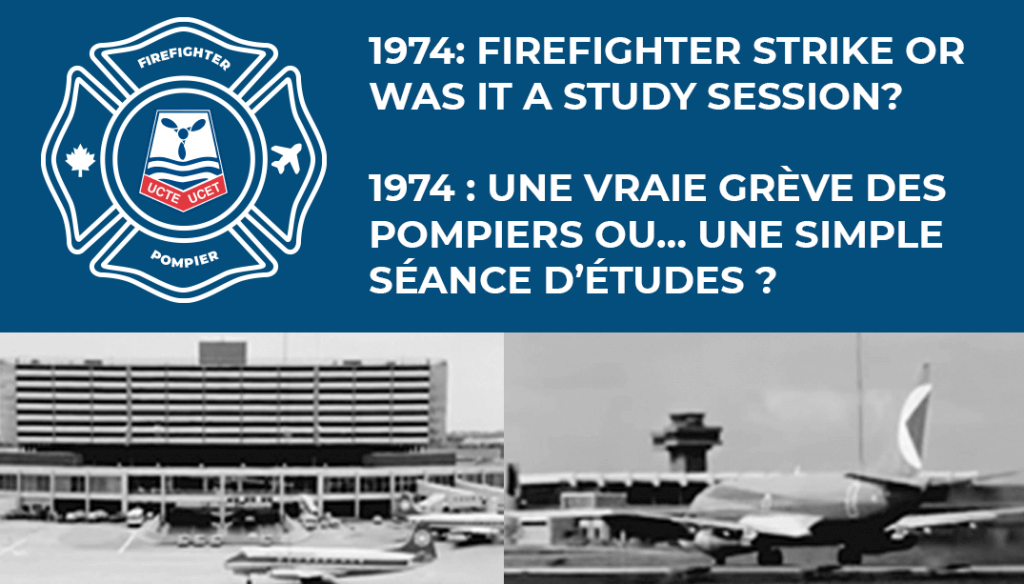Part 1: 1974 – Firefighter strike or was it a study session?
As part of UCTE’s continued exploration of its history, comes part 1 of a a3-part story about our first strike
In 1967, after decades of lobbying and agitation by the staff associations, Parliament passed Bill-170, the Public Service Staff Relations Act, which finally gave federal employees the right to unionize and to strike if they wanted. No more going cap in hand to request improvement in wages and benefits but instead the power to demand was now in the hands of federal public employees.
Federal employees were quick to sign union cards and in September of 1967, the Public Service Alliance of Canada gave notice to bargain for the Heating and Power (HP) and Firefighter (FR) members. The first ever PSAC collective agreements were for these two bargaining units, signed in April of 1968. The new union only formed in 1966 was off to a fast start.
By 1968 the PSAC was the bargaining unit for 53 groups. Of those only 8 were on the conciliation/strike route. Despite that the membership made it clear in those early days that they were going to take their fate into their own hands. The first strike in the history of the PSAC was a wildcat in the spring of 1970 by customs officers at the Windsor-Detroit crossing. The following year the Union of National Defence Employees took the first legal strike against Defence Construction at two locations. Then in the early 1970 members of the Union of Canadian Transportation Employees started taking job actions by holding wildcat strikes.
How it all began
On Saturday April 6, 69 firefighters at Vancouver Airport and 9 at other BC Airports walked off the job. They defied a court injunction issued hours later to return to work staying off the job. Their issue was wage parity with Vancouver City firefighters. Federal airport firefighters were paid $9,160 a year while city firefighters received $13,000. Negotiations on the collective agreement had broken off after 90 minutes with the Public Service Alliance of Canada (PSAC) complaining that the federal officials in the Treasury Board could not make decisions. Bill Brown of the PSAC, told the media “They don’t have the power to do it.”
Hundreds of stranded passengers drove to Seattle Washington to catch US flights. With flights not arriving in BC the airports, Edmonton and Calgary airports quickly started to fill with both Air Canada and Canadian Pacific flights forced to land there. Buses were then used to transport people to the coast. While Vancouver firefighters maintained a crew for medical evacuation flights throughout the weekend, air travel was slowly coming to a standstill.
On Wednesday April 10, 1974, the strike was the subject of an emergency debate in the House of Commons. Transport Minister Jean Marchand, announced to the MPs that the Vancouver Airport would be reopened later that day. But the workers did not return as talks to settle the strike failed. Local officials vowed the walkout will continue even if the firefighters “have to go to jail.”
Airlines were forced to reduce schedules even after the partial re-opening of the Vancouver Airport which was only operational from 10 am to 6 pm for aircraft under 120,000 pounds with supervisory personnel handling the firefighters’ duties. Air Canada responded by laying off 10% of its employees in Vancouver and Victoria while Canadian Pacific also issued layoffs to its employees.
Vancouver firefighters, members of UCTE Local 20219, wanted parity with City firefighters but that was not going to be an easy fight. PSAC policy on national bargaining was for national rates of pay. Only 5 years earlier, at the first UCTE convention, the 125 delegates called for national pay rates.
Don Duthie, President of the Vancouver Local, and Bill Brown, former UCTE Regional Vice-President flew to Ottawa in an attempt to go around the PSAC to talk directly to Treasury Board officials, but they had no luck. Their hopes were raised when the Treasury Board President, Bud Drury, told the House of Commons that the government “prefers a regional bargaining system that would give Vancouver firefighters comparable pay to other firefighters in the area.”
The dispute was now turning into an internal union disagreement. Duthie said, “each time he and Brown suggested a means of taking care of the Vancouver firefighters’ concerns, the national bargainers for the alliance objected.” The PSAC position was that they could not change their mandate to negotiate a national settlement because the mandate is written into law and union policy. The government helped stir the pot when in the House of Commons, the Treasury Board President said, “The Vancouver group, in effect, is on strike in favour of Treasury Board policy.” But he said the strike is illegal and the men should return to work.
